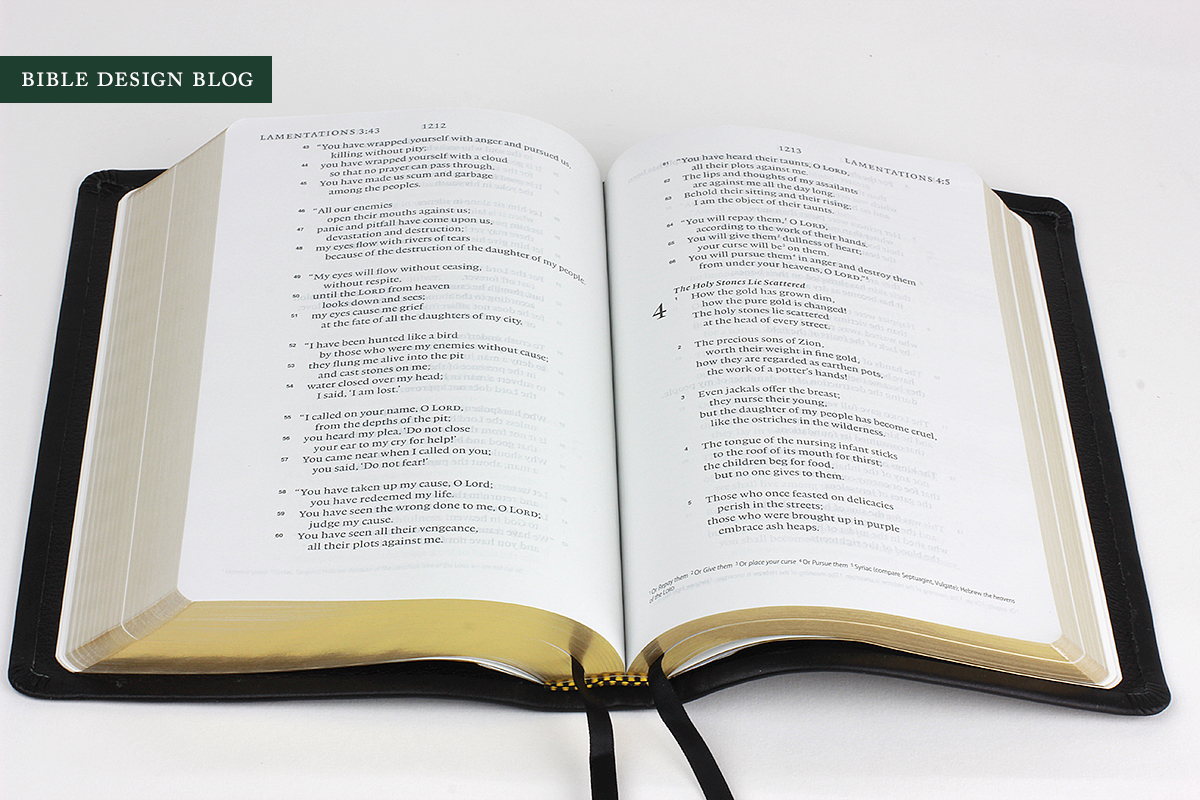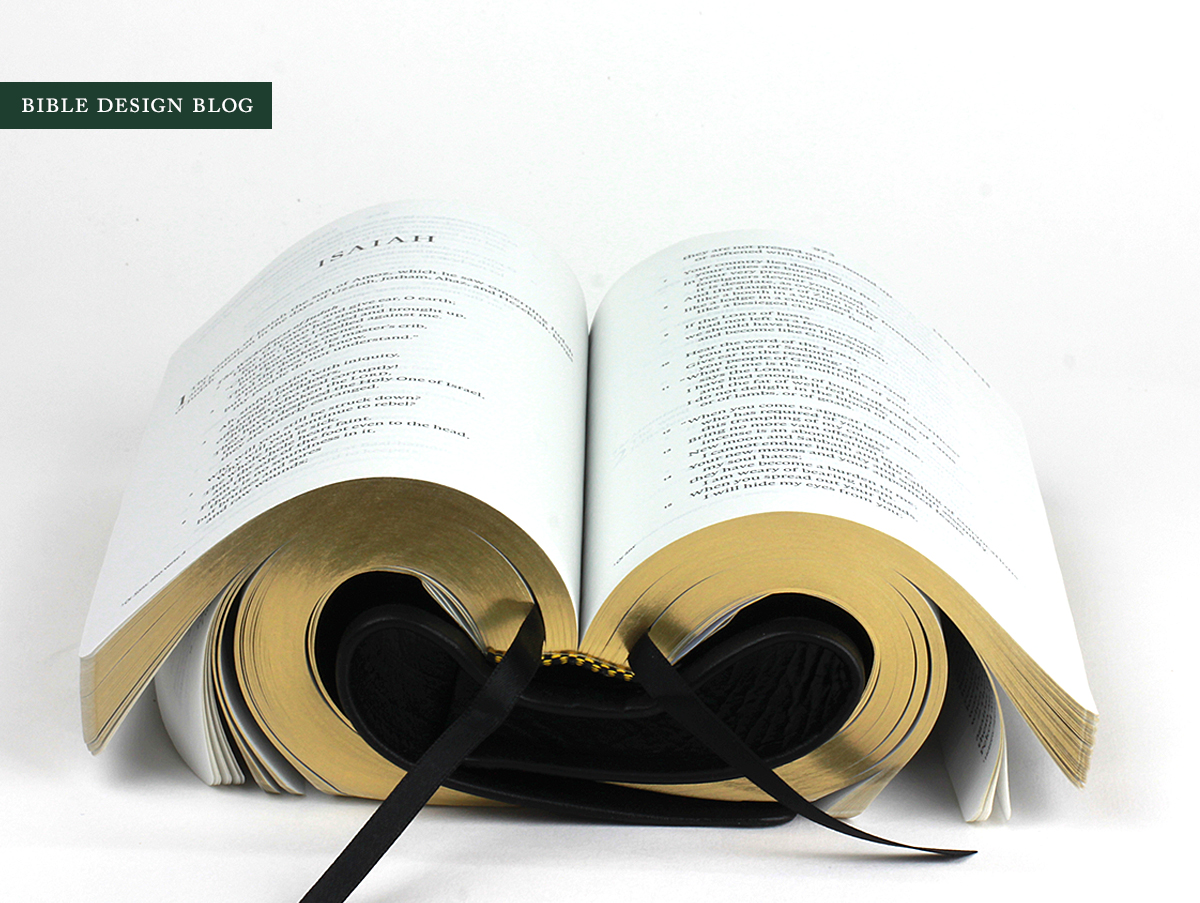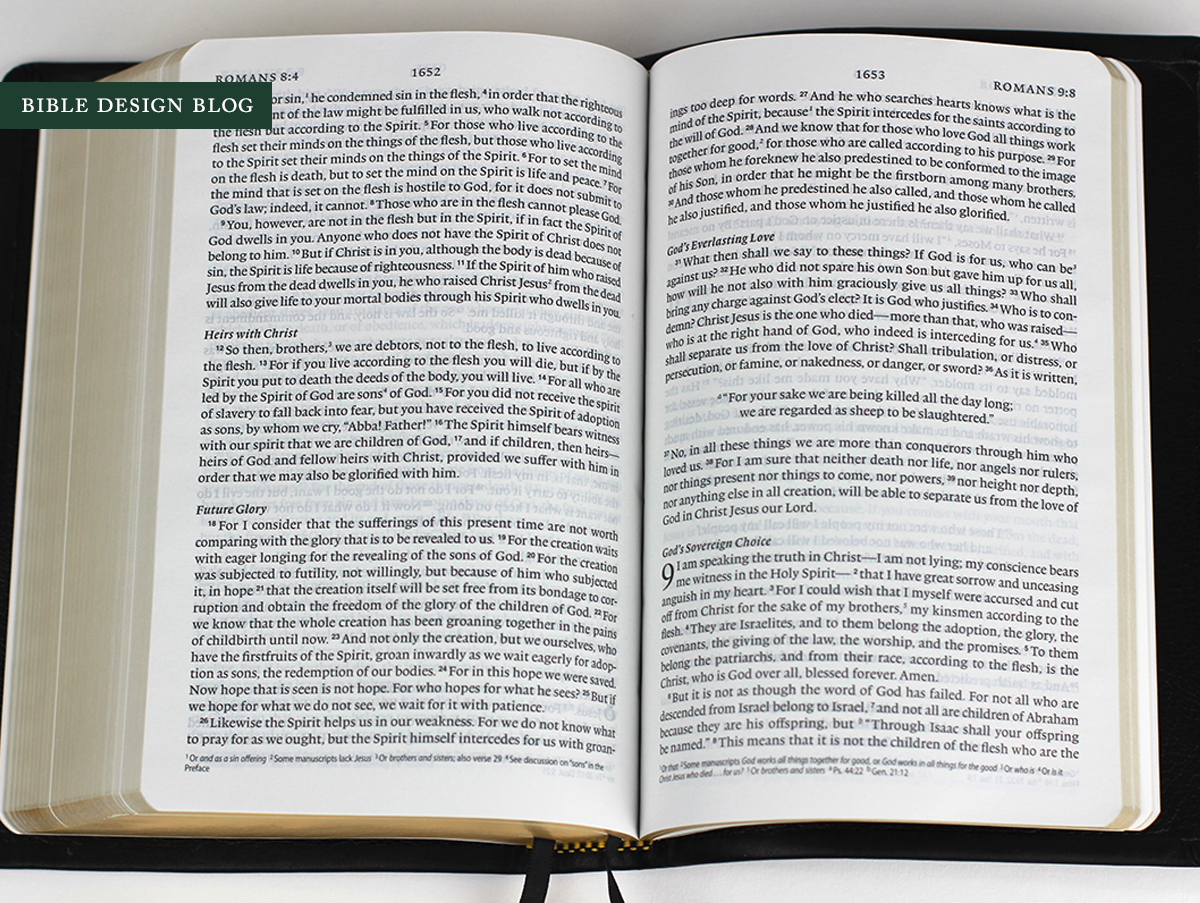Crossway Single Column Heritage Bible (ESV) in Black Calfskin
 Crossway's new Single Column Heritage Bible makes a virtue of simplicity, stripping away the usual cross references in favor of a clean, uncluttered page that gives the text's 9-point type room to breathe. Even though the paper isn't as nice as that found in Crossway's larger Legacy edition, and the fit and finish doesn't measure up to Cambridge's slightly smaller Clarion, when I assembled a selection of single column Bibles and asked people without a horse in the race to pick which one made for easier reading, the answer was the Heritage. It gives you the Clarion's compactness with the Legacy's serene elegance. I do have a couple of gripes with the Heritage, but overall it's a wonderful addition to Crossway's ESV line-up.
Crossway's new Single Column Heritage Bible makes a virtue of simplicity, stripping away the usual cross references in favor of a clean, uncluttered page that gives the text's 9-point type room to breathe. Even though the paper isn't as nice as that found in Crossway's larger Legacy edition, and the fit and finish doesn't measure up to Cambridge's slightly smaller Clarion, when I assembled a selection of single column Bibles and asked people without a horse in the race to pick which one made for easier reading, the answer was the Heritage. It gives you the Clarion's compactness with the Legacy's serene elegance. I do have a couple of gripes with the Heritage, but overall it's a wonderful addition to Crossway's ESV line-up.

Let's get the bad news out of the way first. As time goes on, I gain more and more respect for the big Crossway Legacy, which was printed by LEGO in Italy. The paper is nice to the touch and reasonably opaque, while the book block opens flat and make a lovely candidate for rebinding (as my recent leather-lined Legacy by Leonard's Book Restoration demonstrates). If the smaller Heritage had gotten the same LEGO treatment, I think the results would be fantastic. Unfortunately, the Heritage book block was printed in China. The paper, while comparably opaque, doesn't feel or look as nice. More importantly, the book block does not open flat.
This last point has more to do with the binding -- more below. The review copy in the photos is the higher end calfskin edition bound in Mexico by Abba Bibles. The work from Abba seems to be hit or miss sometimes. I've seen amazing covers from them, and I've seen covers that are a little bit rough. This is one of the latter, as you'll see in some of the photos. It's still quite nice -- and at the sub-$100 prices I have seen online, still good value for money. But a text setting this nice deserves a binding that opens flat. My review copy also has a strong smell, more chemical than leather.
Pro tip: The reason the Heritage doesn't open flat is that the binding features a strong, stiff hinge. While the cover itself is limp, this hinge hugs the book block, preventing it from opening. To fix the problem, you'll need to locate the hinge sides (at the start of the records section in front, and the end of the maps in the rear) and gently bend them back in alignment with the cover. You'll recognize the hinges by the thick white stitching visible in the gutter when you open them. While the Bible won't open entirely flat after this operation, it will perform much, much better than what you see in the photos.
The noteworthy thing about the Heritage, however, is what a difference the uncluttered interior makes to readability. In terms of both size and layout, this Bible looks like the kind of book you typically read, whether fiction or nonfiction. There's nothing challenging about the layout, no special formatting to puzzle over. Instead, you can plunge right in and experience the text. It's wonderful.
Next year, Crossway plans to release the ESV Reader's Bible, which does away with chapter and verse numbers, section headings, and other intrusions on the text to provide a pristine reading experience. I haven't seen page proofs yet, but I'm looking forward to that. Even so, you may be surprised just how close the Heritage comes to providing the target experience. The combination of de-cluttering, 9-point type, and 11-point leading (line spacing) really do make a visual impact. The 8" x 5.5" trim size puts this edition in trade paperback territory, with a width of less than 1.5" contributing to its handy feel.
Line-matching looks good throughout my review copy, and the print impression seems consistent. Gilding on page edges is weak, which seems to be typical with Crossway editions, and I'm not a fan of the two thin ribbons (though they're of a sufficient length to do their job, which is welcome). The strengths of the book block outweigh these negatives to me. The Heritage makes a great Bible for introducing people to the benefits of a single column text setting. I expect that for people searching for that simple, readable edition, this will be a welcome discovery.
J. Mark Bertrand is a novelist and pastor whose writing on Bible design has helped spark a publishing revolution. Mark is the author of Rethinking Worldview: Learning to Think, Live, and Speak in This World (Crossway, 2007), as well as the novels Back on Murder, Pattern of Wounds, and Nothing to Hide—described as a “series worth getting attached to” (Christianity Today) by “a major crime fiction talent” (Weekly Standard) in the vein of Michael Connelly, Ian Rankin, and Henning Mankell.
Mark has a BA in English Literature from Union University, an MFA in Creative Writing from the University of Houston, and an M.Div. from Heidelberg Theological Seminary. Through his influential Bible Design Blog, Mark has championed a new generation of readable Bibles. He is a founding member of the steering committee of the Society of Bible Craftsmanship, and chairs the Society’s Award Committee. His work was featured in the November 2021 issue of FaithLife’s Bible Study Magazine.
Mark also serves on the board of Worldview Academy, where he has been a member of the faculty of theology since 2003. Since 2017, he has been an ordained teaching elder in the Presbyterian Church in America. He and his wife Laurie life in Sioux Falls, South Dakota.







